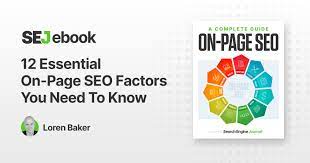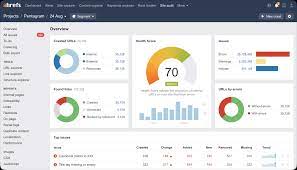Mastering On-Page SEO Techniques for Website Success
The Importance of On-Page SEO for Your Website
Search Engine Optimization (SEO) is crucial for improving your website’s visibility and ranking on search engine results pages. While off-page SEO plays a significant role, on-page SEO is equally important in ensuring that your website is optimised for search engines.
What is On-Page SEO?
On-page SEO refers to the practice of optimising individual web pages to rank higher and earn more relevant traffic in search engines. This includes various elements such as optimizing content, meta tags, headings, images, and internal links on a webpage.
The Benefits of On-Page SEO
- Improved Search Engine Ranking: By implementing on-page SEO best practices, you can improve your website’s ranking on search engine results pages.
- Enhanced User Experience: Optimising your website’s on-page elements can enhance user experience, leading to lower bounce rates and increased engagement.
- Increased Organic Traffic: Effective on-page SEO can help drive more organic traffic to your website by making it more visible to users searching for relevant keywords.
- Better Conversion Rates: When your website is properly optimized with on-page SEO techniques, it can lead to higher conversion rates as users are more likely to engage with your content.
Key Elements of On-Page SEO
Some key elements of on-page SEO include:
- Title Tags: Optimising title tags with relevant keywords can improve click-through rates from search engine results pages.
- Meta Descriptions: Writing compelling meta descriptions can entice users to click through to your website.
- Heading Tags: Proper use of heading tags (H1-H6) helps search engines understand the structure and hierarchy of your content.
- Keyword Optimization: Incorporating relevant keywords naturally throughout your content helps improve visibility for those terms.
- Image Alt Text: Adding descriptive alt text to images improves accessibility and provides another opportunity for keyword optimization.
- User-Friendly URLs: Creating clean and descriptive URLs makes it easier for both users and search engines to understand the page’s topic.
In conclusion, on-page SEO is a fundamental aspect of any comprehensive SEO strategy. By focusing on optimizing individual web pages with relevant content and key elements, you can enhance your website’s visibility, attract more organic traffic, and ultimately improve your online presence.
Top 5 On-Page SEO Tips for Boosting Your Website’s Performance
- 1. Use relevant keywords in your page titles and meta descriptions.
- 2. Optimize your headings (H1, H2, etc.) with targeted keywords.
- 3. Create high-quality and engaging content that is valuable to your audience.
- 4. Improve the loading speed of your website for better user experience and SEO performance.
- 5. Utilize internal linking to connect related pages within your website.
1. Use relevant keywords in your page titles and meta descriptions.
Utilising relevant keywords in your page titles and meta descriptions is a crucial tip for effective on-page SEO. By incorporating targeted keywords that align with your content, you can enhance the visibility of your web pages on search engine results pages. Page titles and meta descriptions serve as a brief preview of your content to both search engines and users, making it essential to include keywords that accurately reflect the topic of the page. This practice not only improves search engine ranking but also entices users to click through to your website by providing a clear indication of what they can expect from your content.
2. Optimize your headings (H1, H2, etc.) with targeted keywords.
To enhance your on-page SEO, it is crucial to optimise your headings, such as H1 and H2 tags, with targeted keywords. By incorporating relevant keywords into your headings, you can signal to search engines the main topics of your content and improve its visibility for those specific terms. Strategic use of headings not only helps search engines understand the structure and relevance of your content but also enhances the user experience by providing a clear hierarchy of information on the webpage.
3. Create high-quality and engaging content that is valuable to your audience.
Creating high-quality and engaging content that provides value to your audience is a crucial aspect of on-page SEO. By crafting content that is informative, relevant, and engaging, you not only attract the attention of your target audience but also establish credibility and authority in your industry. Valuable content not only helps improve your website’s search engine ranking but also encourages user engagement, leading to increased organic traffic and better conversion rates. Remember, quality content is key to capturing the interest of your audience and keeping them coming back for more.
4. Improve the loading speed of your website for better user experience and SEO performance.
Improving the loading speed of your website is a crucial tip for enhancing user experience and boosting SEO performance. A fast-loading website not only provides visitors with a seamless browsing experience but also signals to search engines that your site is well-optimised and user-friendly. By prioritising loading speed optimisation, you can reduce bounce rates, increase engagement, and ultimately improve your website’s search engine ranking. Investing in speeding up your website can have a significant impact on both user satisfaction and SEO success.
5. Utilize internal linking to connect related pages within your website.
To enhance your on-page SEO strategy, it is essential to utilise internal linking effectively by connecting related pages within your website. By incorporating internal links strategically, you not only improve the user experience by guiding visitors to relevant content but also help search engines understand the structure and hierarchy of your website. This practice can boost the authority of your pages and improve overall site visibility, ultimately contributing to a more cohesive and well-optimised online presence.

